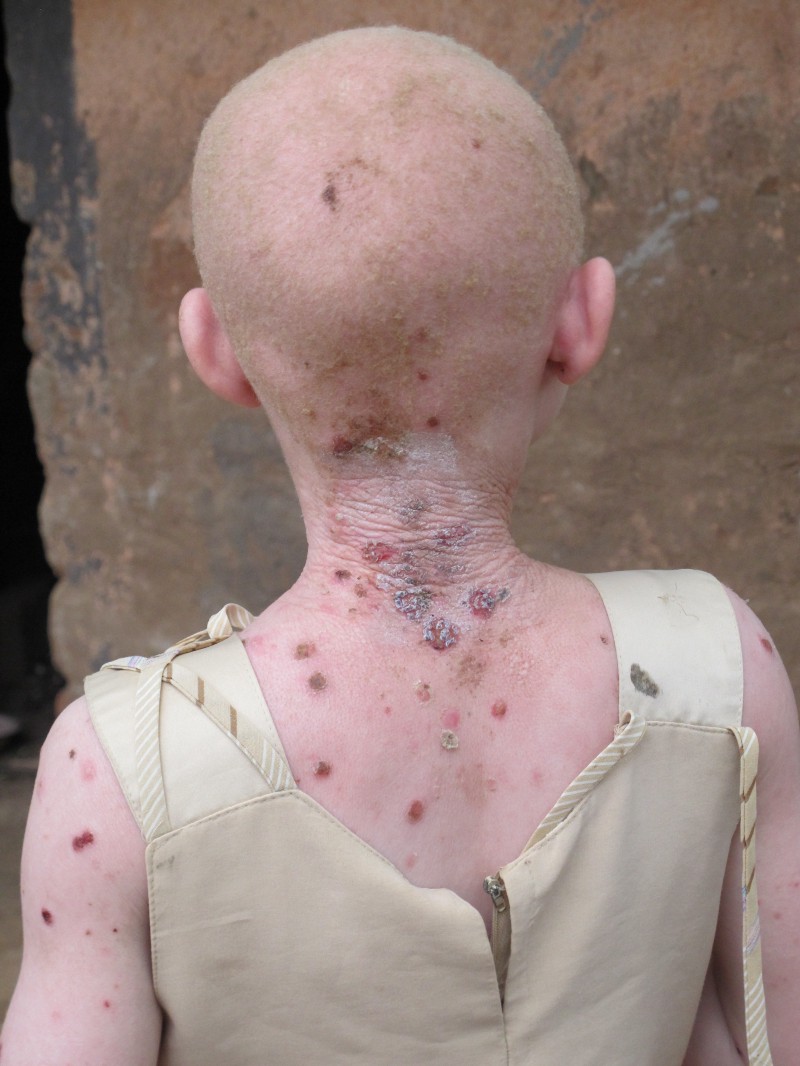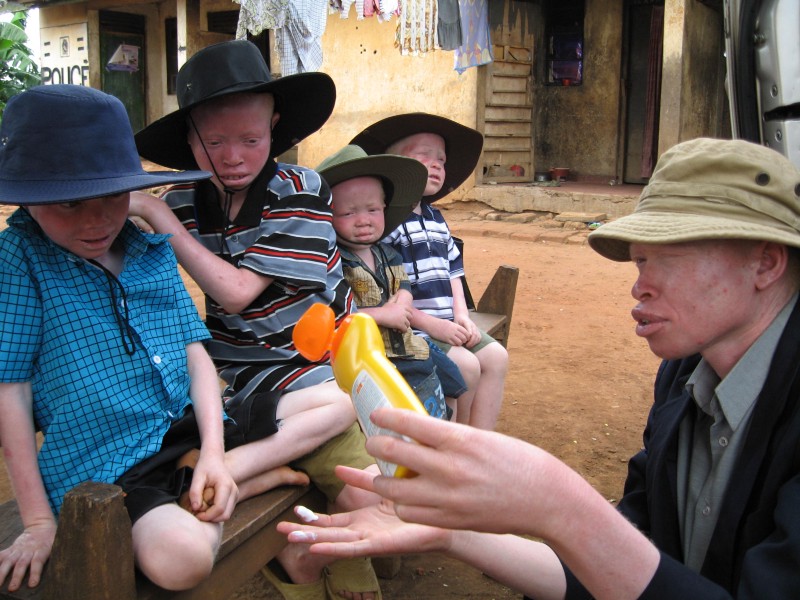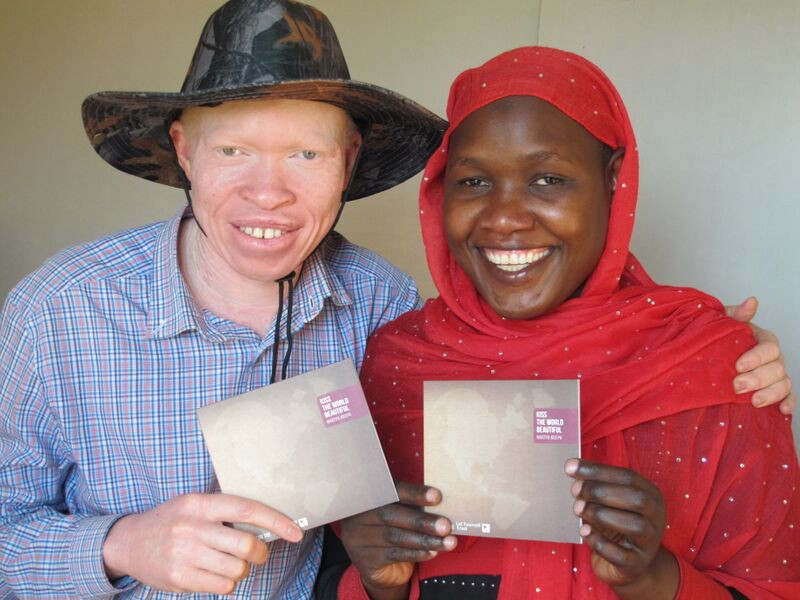Living with Albinism
The plight of the unseen and the unheard
A mother in the Busoga sub-region of Uganda
The definition of albinism is this — an inherited genetic condition, in which a person receives two recessive genes causing the enzyme that produces skin pigment, melanin, to be absent.
It is a very simple description of a not often discussed condition that leads to multiple and extreme challenges.
Outside of Africa, an estimated 1 in 20,000 people have albinism worldwide. In Africa, the figure increases dramatically — the average rises to 1 in 5,000. In some places in Uganda & Tanzania, the rate is even higher, approx 1 in 1,000.
People with albinism in Africa face a barrage of concerns that can be distilled into two major, heartbreaking categories — health risks & discrimination factors.
The most immediate health concern that starts at birth is this:
98% of people with albinism will die of skin cancer before the age of 40.
From the moment a child is born with albinism, skin cancer is a risk. The minimal or complete lack of skin pigment (melanin) makes them extremely vulnerable to sunburn, solar elastosis (wrinkling), and sore & rough lips at risk of turning cancerous. In Africa, poor access to knowledge, money and medical care means that most people with albinism do not adequately protect themselves from the harsh sun.
80% of people with albinism in sub-Saharan Africa die from skin cancer before the age of 30. A terrifying 98% are dead by 40. Skin lesions start appearing early on children, and are preventable with life saving tools such as sunscreen & hats.
Additional health risks include visual impairments — sensitivity to light, involuntary movements — that lead to difficulties learning in school as a child and increasingly diminished sight as an adult.
Education is needed for teachers, to provide children with albinism front row seats due to lack of vision.
The other major challenge faced is due to people with albinism being visibly very different from their dark-skinned peers. Their pale appearance, combined with public ignorance, has led to isolation and discrimination due to many widespread false beliefs, including:
The homes of people with albinism are cursed.
- A child with albinism is a result from impregnation of the mother by a colonialist ghost or white man.
- Touching a person with albinism brings bad luck.
- People with albinism are ghosts who don’t die.
- Sex with an albino woman will cure HIV.
- Charms made by witch doctors using the body parts of people with albinism (especially women & children) will bring great luck & wealth.
As a result, people with albinism are misunderstood and ostracised from their communities. They are often excluded from education and have limited opportunities to earn a sustainable income. The high demand for limbs, hair and nails from witch doctors causes many people with albinism to live in constant fear for themselves and their children.
What is being done?
Very few organisations are working to support people with albinism worldwide — Advantage Africa is one of them.
Started in 2002 by husband and wife Andrew & Jane Betts, Advantage Africa’s project in the Busoga sub-region of Uganda is directly supporting 300 people with albinism to overcome their challenges and improve all aspects of their lives.
Their specific goals are for these 300 children and adults to:
- Feel safe, accepted and included within their communities
- Access equal and appropriate early & primary education
- Access timely and appropriate healthcare & medical interventions
- Benefit from improved economic empowerment
Even more specifically, Jane & Andrew’s team make home visits to families affected by albinism to offer both practical and moral support, train teachers to help children learn, do skin checks, referrals and treatments, and give access to much needed resources such as hats, sunglasses, sunscreen and long-sleeved shirts to prevent skin cancer.
Advantage Africa is supporting children and adults with albinism in Uganda with high SPF sunscreen, lip salve, hats and long-sleeved clothing so they can stay safe from skin cancer and have the chance of a full life.
They also advocate for improved services through government, faith communities & media, and work to build skills and capacities of on the ground organisations.
With their partner SNUPA in Uganda, Advantage Africa is dispelling the myths and superstitions surrounding albinism through village meetings, newspapers, TV and radio so that people no longer live in fear for their lives.
Advantage Africa currently has no grants for this project, and their work is being carried out on a shoestring. The partnership of Let Yourself Trust in this project is incredibly valuable, and will have immediate on the ground impact.
The funds raised will help children thrive in school with magnifiers, improve levels of skin protection with more frequent supplies of sunscreen, offer cryosurgery to remove skin areas at high risk of turning into life threatening carcinomas, and help provide for a Severe Hardship Fund that will fund life saving surgeries and enable its beneficiaries to establish sustainable ways of providing for their families.
Available for the first time in Uganda, Advantage Africa is supporting dermatologist Dr. Ngobi to perform cryosurgery to remove pre-cancerous lesions from the skin of people with albinism. This vital work is stopping skin cancer in its tracks!
Advantage Africa is helping people with albinism to have life-saving surgery for skin cancer. Sarah had cancer around her eye and on her neck and chest. She is now completely free of cancer and returned home to the overwhelming joy of her children and family.
How can you help support Let Yourself & Advantage Africa’s work on albinism?
You can make a donation to this life saving work.
You can contact us to become a monthly donor — admin@letyourself.net
You can stay up to date with us on Facebook & Twitter
You can share this article with your family & friends and help advocate against the discrimination of people with albinism.
Our deepest gratitude for your support.
Peter & Fazira, a vital part of Advantage Africa’s team on the ground in Uganda, hold their copies of Martyn Joseph’s “Kiss the World Beautiful”.










